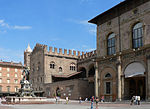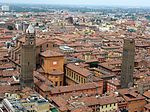Bologna (, UK also , Italian: [boˈloɲɲa] (listen); Emilian: Bulåggna [buˈlʌɲːa]; Latin: Bononia) is a city in and the capital of the Emilia-Romagna region in Northern Italy, of which it is also its largest. It is the seventh most populous city in Italy with about 400,000 inhabitants and 150 different nationalities. Its metropolitan area is home to more than 1,000,000 people. It is known as the Fat City for its rich cuisine, and the Red City for its Spanish-style red tiled rooftops and, more recently, its leftist politics. It is also called the Learned City because it is home to the oldest university in the world.Originally Etruscan, the city has been an important urban center for centuries, first under the Etruscans (who called it Felsina), then under the Celts as Bona, later under the Romans (Bonōnia), then again in the Middle Ages, as a free municipality and later signoria, when it was among the largest European cities by population. Famous for its towers, churches and lengthy porticoes, Bologna has a well-preserved historical centre, thanks to a careful restoration and conservation policy which began at the end of the 1970s. Home to the oldest university in continuous operation, the University of Bologna, established in AD 1088, the city has a large student population that gives it a cosmopolitan character. In 2000 it was declared European capital of culture and in 2006, a UNESCO "City of Music" and became part of the Creative Cities Network. In 2021 UNESCO recognized the lengthy porticoes of the city as a World Heritage Site.Bologna is an important agricultural, industrial, financial and transport hub, where many large mechanical, electronic and food companies have their headquarters as well as one of the largest permanent trade fairs in Europe. According to the most recent data gathered by the European Regional Economic Growth Index (E-REGI) of 2009, Bologna is the first Italian city and the 47th European city in terms of its economic growth rate.










